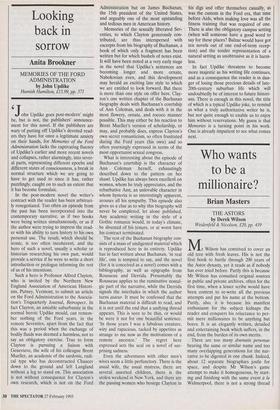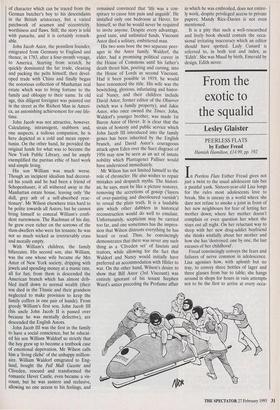Who wants to be a millionaire?
Brian Masters
THE ASTORS by Derek Wilson Weidenfeld & Nicolson, £20, pp. 439 Mr Wilson has contrived to cover an old tree with fresh leaves. His is not the first book to hurtle through 200 years of the Astor dynasty, yet it reads as if nobody has ever tried before. Partly this is because Mr Wilson has consulted original sources in public and private archives, often for the first time, when a lesser scribe would have been content to re-write all the previous attempts and put his name at the bottom. Partly, also, it is because his manifest enthusiasm for the subject kidnaps the reader and conquers his reluctance to per- mit mere millionaires to be anything but bores. It is an elegantly written, detailed and entertaining book which suffers, in the end, from the burden of its own merits.
There are too many dramatis personae bearing the same or similar name and too many overlapping generations for the nar- rative to be digested in one chunk. Indeed, about 12 separate biographies jostle for space, and despite Mr Wilson's game attempt to make it homogeneous, by start- ing and finishing with the same event a la Widmerpool, there is not a strong thread
of character which can be traced from the German butcher's boy to his descendants in the British aristocracy, but a varied patchwork of acumen and eccentricity, worthiness and flaws. Still, the story is told with panache, and it is certainly remark- able.
John Jacob Astor, the penniless founder, emigrated from Germany to England and thence, in 1783, after a four-month voyage, to America. Starting from scratch, he quickly dominated the fur trade, cleaning and packing the pelts himself, then devel- oped trade with China and finally began the notorious collection of Manhattan real estate which was to bring fortune to the family and obloquy to their name. In old age, this diligent foreigner was pointed out in the street as the Richest Man in Ameri- ca, an astonishing achievement for one life- time.
John Jacob was not attractive, however. Calculating, intransigent, stubborn and, one suspects, a tedious companion, he is here depicted as a cold and mean oppor- tunist. On the other hand, he provided the original funds for what was to become the New York Public Library, and he amply exemplified the puritan ethic of hard work and simple living.
His son William was much worse. Though an incipient idealism had decorat- ed his youth and he had been a friend of Schopenhauer, it all withered away in the Manhattan estate house, leaving only 'the dull, grey ash of a self-absorbed reac- tionary'. Mr Wilson elsewhere tries hard to be polite towards all Astors, but he cannot bring himself to conceal William's confi- dent narrowness. The Rachman of his day, he grew even richer on the sorrows of the slum-dwellers who were his tenants; he was not so much wicked as irretrievably crass and morally empty.
With William's children, the family bifurcates. His second son, also William, was the one whose wife became the Mrs Astor of New York society, dripping with jewels and spending money at a manic rate, all for fun; from them is descended the American branch which has almost drib- bled itself down to normal wealth (their son died in the Titanic and their grandson neglected to make provision to keep the family coffers in one pair of hands). From greedy William's first son, John Jacob III (his uncle John Jacob II is passed over because he was mentally defective), are descended the English Astors.
John Jacob III was the first in the family to have a social conscience, but he educat- ed his son William Waldorf so strictly that the boy grew up to become a textbook case of emotional deprivation. Mr Wilson calls him a 'living cliché' of the unhappy million- aire. William Waldorf emigrated to Eng- land, bought the Pall Mall Gazette and Cliveden, rescued and transformed the romantic Hever Castle, even became a vis- count, but he was austere and reclusive, allowing no one access to his feelings, and
remained convinced that 'life was a con- spiracy to cause him pain and anguish'. He installed only one bedroom at Hever, for himself, so that he would never be required to invite anyone. Despite every advantage, good taste, and unlimited funds, Viscount Astor died a solitary, embittered man.
His two sons bore the two separate peer- ages in the Astor family. Waldorf, the elder, had a promising political career in the House of Commons until his father's death thrust him, pouting and cursing, into the House of Lords as second Viscount. Had it been possible in 1919, he would have renounced the title. His wife was the bewitching, glorious, infuriating and histor- ical Nancy, and their children include David Astor, former editor of the Observer (which was a family property), and Jakie Astor, who once owned the Times. John, Waldorf's younger brother, was made 1st Baron Astor of Hever. It is clear that the strain of honesty and public service which John Jacob III introduced into the family genes has been inherited by the English branch, and David Astor's courageous attack upon Eden over the Suez disgrace of 1956 may now be seen as an act of innate nobility which Plantagenet Palliser would have understood immediately.
Mr Wilson has not limited himself to the role of chronicler. He also wishes to repair mistakes and despatch myths. The histori- an, he says, must be like a picture restorer, removing the accretions of gossip (`layers of over-painting and discoloured varnish') to reveal the plain truth. It is a laudable aim which other dabblers in historical reconstruction would do well to emulate. Unfortunately, scepticism may be carried too far, and one sometimes has the impres- sion that Wilson distrusts everything he has heard or read. Thus, he convincingly demonstrates that there was never any such thing as a 'Cliveden set' of fascists and traitors, while allowing for the fact that Waldorf and Nancy would initially have preferred an accommodation with Hitler to war. On the other hand, Wilson's desire to show that Bill Astor (3rd Viscount) was entirely ignorant of his tenant Stephen Ward's antics preceding the Profumo affair in which he was embroiled, does not entire- ly work, despite privileged access to private papers; Mandy Rice-Davies is not even mentioned.
It is a pity that such a well-researched and lively book should contain the occa- sional irritating inaccuracy which an editor should have spotted. Lady Cunard is referred to, in both text and index, as `Edith'. She was Maud by birth, Emerald by design, Edith never.



















































 Previous page
Previous page